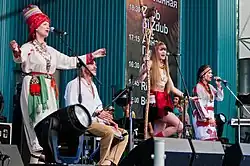Music of Russia |
|---|
| Oblasts |
- Amur
- Arkhangelsk
- Astrakhan
- Belgorod
- Bryansk
- Chelyabinsk
- Irkutsk
- Ivanovo
- Kaliningrad
- Kaluga
- Kemerovo
- Kherson 1
- Kirov
- Kostroma
- Kurgan
- Kursk
- Leningrad
- Lipetsk
- Magadan
- Moscow
- Murmansk
- Nizhny Novgorod
- Novgorod
- Novosibirsk
- Omsk
- Orenburg
- Oryol
- Penza
- Pskov
- Rostov
- Ryazan
- Sakhalin
- Samara
- Saratov
- Smolensk
- Sverdlovsk
- Tambov
- Tomsk
- Tula
- Tver
- Tyumen
- Ulyanovsk
- Vladimir
- Volgograd
- Vologda
- Voronezh
- Yaroslavl
- Zaporozhye 1
|
|---|
| Republics | |
|---|
| Krais |
- Altai
- Kamchatka
- Khabarovsk
- Krasnodar
- Krasnoyarsk
- Perm
- Primorsky
- Stavropol
- Zabaykalsky
|
|---|
| Autonomous okrugs |
- Chukotka
- Khanty-Mansi
- Nenets
- Yamalo-Nenets
|
|---|
| Federal cities |
- Moscow
- St. Petersburg
- Sevastopol1
|
|---|
| Autonomous oblasts | |
|---|
1 Recognized by most states as part of Ukraine. |
The music of the Republic of Mordovia has a long history.
The Republic of Mordovia is a federal subject of Russia (a republic). Its national anthem is "Šumbrat, Mordovija" (Hail, Mordovia!) by Sergey Kinyakin and Nina Kosheleva, adopted in 1995.
Mordovian folk music has become an inspiration for revivalist work of contemporary groups, such as Toorama and Oyme. Bakich Vidiai is an Erzya pop singer.
Among the traditional Mordvin musical instruments is the puvama, a double-chantered bagpipe.
External links
|
|---|
| Sovereign states | |
|---|
States with limited
recognition | |
|---|
Dependencies and
other entities | |
|---|
.jpg) Mordvin musician with a puvama
Mordvin musician with a puvama Mordovian band OYME
Mordovian band OYME